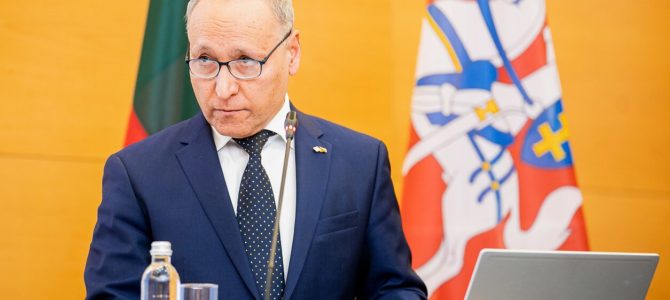LRT.lt
Who would have thought a few weeks ago we’d wake up one morning and suddenly find ourselves in a Netflix horror film? That our cities would be placed under quarantine and would become completely empty in a single day? That’s we’d all be sitting at home, day after day, from morning to night, not changing out of our pajamas? That we would be banned from visiting our grandmothers? That we would pray through the nights for this nightmare to end?
In the spring of 2020 we suddenly realized we are all the same, Lithuanians and Israelis, Germans and Italians, Chinese, Russians and Arabs. We are all people. We know how to make rockets and smart apps, but we are really such fragile creatures who fear death and hide from a tiny little virus which is going around and could affect us. We are the new dinosaurs whose time has probably come.
We suddenly realized most of our disputes aren’t important, like those of children in the sandbox. Fighting for half a mountain or half a lake. We in Israel were not surprised at all when terror attacks from the Gaza Strip fell dramatically, by 90%! When we see frightened and weeping Iranians on the streets of Tehran, they are in our hearts. We and they are in the same boat, we are all victims of an external attack.
But we shouldn’t we take responsibility for this threat? “Our planet is mad at aus,” my mother, an 80-year-old woman, told me, sitting in a small town in Israel, behind closed doors in her room. I call her ten times a day just to see her lovely face which I miss so much. I call and hope her simple telephone which she refuses to replace won’t stop working. “We are very bad to this world,” she says, “this world is mad at us and wants to teach us a lesson.” I’ve thought a lot about my mother’s words. So many species of animal have gone extinct because of our greed and insatiable consumption. And suddenly here some small thing jumps from animals to man. Was this misfortune only a matter of time?
This is truly a challenging time. One of the most serious challenges we have ever faced. Our children imprisoned in their rooms will never forget this challenge. The first challenge is about solidarity. Yes, we are competing to see who first comes up with a vaccine for this infection, but we are now more interdependent than ever before. Young doctors and researchers from Kaunas, Berlin, Tel Aviv, Seoul and Buenos Aries are working together cheerfully to overcome this disease. It would be tragic if the idea of globalization fell victim to this pandemic. Nationalism, egoism and segregation are a disaster. Working together and solidarity are so important at this time. Just as among people, countries need friends, too.
The second challenge is connected with the confidence we feel towards our countries. We are giving up some of our personal rights and hope that our governments don’t begin abusing our personal information and won’t use it for bad purposes. This is an unwritten agreement between us and the state. It is as if we are coming together and withdrawing to the margins, but only temporarily, until this battle ends.
The third challenge which we must pass through is connected with our family values. We are rediscovering the family hearth. The old family hearth. The isolation placed upon us has helped us take a look around and to rediscover the people we truly love. Our children whom we watch grow, our parents whom we need, our partners which we were glad to flee each morning for work. In a highly absurd way, this epidemic has forced us to redraw our personal boundaries and to understand anew who we are.
The fourth challenge we are undergoing is the sense of loneliness. Our social concept is currently experiencing a major shock. From first grade we were taught we are social creatures. Now we withdraw from people and fear them. If a woman at the store coughs in front of us, we are severely frightened. Now our homes are our castles, but we should remember this is a temporary castle. We need people more than we need masks and gloves.
What will we do when this nightmare is over? Will we return to our daily life, which seems like a recipe for future disaster? Will we all remember our personal decision to change our lives, to at least a little reduce our greed, eat more healthily and have greater appreciation for our food items of plant origin, and will we spend more time with our families?
Will the morning the quarantine ends be the beautiful and more just beginning of something else? Do we have to await a decision from somewhere on high, or can’t we ourselves make a personal resolution which we can begin putting into practice tomorrow? As always, I tend towards the pessimistic, but I do believe a new start can be and will be fashioned by our own hand.


